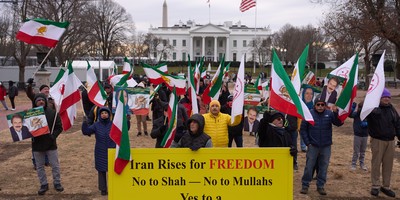I ran into Kirsten Powers briefly in Washington, D.C., the other day, and afterward I thought to myself: "I hope she knows she is a profile in courage."
"The more I got to know actual conservative and religious people, the harder it was to justify the stereotypes I had carelessly embraced," Powers writes in her new book, "The Silencing: How the Left Is Killing Free Speech."
In her early days at Fox News, on which she is a frequent presence, the pundit recalls: "I can remember trying to convince a conservative ... that George Bush's nomination of Harriet Miers to the Supreme Court didn't really count as a female appointment because she was conservative and an evangelical Christian."
Today Powers is "embarrassed that I ever thought such a thing, let alone said it aloud."
She writes: "Such a prejudiced view was only able to take root because of the lack of ideological, political, and religious diversity in my world."
In her book, Powers chronicles the impulse on the left, from the highest levels of government down to the shrillest blog, to shut down speech that takes an opposing or alternative view.
This intolerance isn't liberalism but a tyrannical impulse often masked under words like freedom and tolerance.
John Carr, who used to work at the U.S. Catholic Bishops' Conference, started a forum at Georgetown University when he retired from the USCCB a few years ago that brought people of different political stripes together. On one such panel, I sat next to a bishop I had previously mostly known as the go-to cleric for criticisms of Rep. Paul Ryan's budgets. Sitting down and discussing Pope Francis and poverty, it turned out we had a lot in common.
Recommended
When we can take a moment to encounter another person and begin to develop a relationship, with a little honesty, something beautiful might just happen.
Powers is a profile in courage because she aims for the truth. She is eminently humble. If the truth takes her down a road she hadn't considered, she'll consult some experts, take a look, and, as you've seen, even apologize. Imagine that!
That doesn't mean you have to water anything down. It does mean admitting we're human and get things wrong now and again, even in what we thought were our best defenses of what's true and good.
"Truth is like a threshing-machine; tender sensibilities must keep out of the way," Herman Melville wrote in "The Confidence Man." When I asked Philadelphia Archbishop Charles J. Chaput why he used Melville's line to open an e-book of his on religious freedom, he talked about the need for civility and honesty in our public discourse.
"The truth can be difficult, so we often want to soften its edges. But this just wastes time and compounds our problems. Candor can be uncomfortable in the short run, but it's much healthier in the long run," Chaput told me.
"The point is this," he continued: "We need to be frank with each other as Christian adults, frank in our public witness and frank in our own self-criticism. Again, we also need to be prudent and kind -- but not at the expense of courage, and not at the expense of speaking the truth."
In "The Silencing," Powers quotes my colleague David French, reflecting on what he's seen on college campuses: "Anti-Christian discrimination can be reflexive" but "a little bit of intellectual diversity can go a long way towards reversing its effects."
"The moral of the story is simple," Powers concludes. "We should all make efforts to invite people who hold different views into our worlds. Contrary to popular thought, familiarity doesn't breed contempt. It breeds understanding and tolerance. Now, go make some unlikely friends."
This certainly sounds better than the quality of our current discourse!
























Join the conversation as a VIP Member